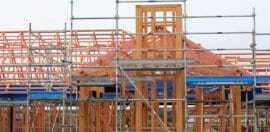Housing and homelessness agreement savaged in Productivity Commission report

3 October 2022 at 5:34 pm
The Productivity Commission delivers its verdict on Australia’s housing and homelessness agreement, with extensive recommendations for its future.
A Productivity Commission report into Australia’s housing crisis has denounced the National Housing and Homelessness Agreement (NHHA), calling it “ineffective”.
In a scathing review, the report found that the NHHA is “a funding contract, not a blueprint for reform” and “does not foster collaboration between governments or hold governments to account”.
The comments led the In need of repair: The National Housing and Homelessness Agreement study report, which reaffirmed that Australia is in the grips of a housing crisis.
Over the life of the NHHA, #housing affordability has deteriorated especially for private #renters. About 1 in 5 low-income households are left with less than $250 after paying their weekly rent. More in our report: https://t.co/4LpUcPcHZq
— Productivity Commission (@ozprodcom) September 29, 2022
How bad is the crisis?
According to the report’s data, low income households are now spending 17 per cent of their income on housing, compared to 14 per cent in 1999-2000.
Early data also suggests the private rental market has tightened since the pandemic, and renters are now younger, have lower incomes and are renting for longer than they used to.
The majority of private renters — 66 per cent — with low incomes spent over 30 per cent of their income on rent in 2019-20, while 20 per cent spent more than half their income on rent.
The median rent burden for the lowest earning households was 43 per cent in 2019-20.
A person is considered to be in rental stress if they spend more than 30 per cent of their income on rent and are in the bottom 40 per cent of income distribution, suggesting that many of Australia’s renters are already in rental stress.
The number of people seeking support from specialist homelessness services (SHSs) has increased every year since 2011-12, the report said, with with around 114,000 requests going unassisted, up from 95,000 unanswered requests in 2016-17.
Almost 40 per cent of the 176,000 households on the social housing waiting list last year were assessed as being in greatest need.
Home ownership rates are falling, with the deposit required seen as the biggest barrier to buying a home.
According to the report, low interest rates mean homeowners have typically spent less of their income on housing than renters, but the recent rise in interest rates could reverse this trend.
Low income earners have historically spent a greater proportion of their income on housing, with 17 per cent of low income earners spending more than 50 per cent of their income keeping a roof over their heads in 2019-20.
What about the NHHA?
The report notes that the NHHA is an agreement for the federal government to fund states to support housing and homelessness programs.
It says the NHHA “does not… set out a national reform agenda” for housing.
While the goal underlying the NHHA is “sound”, the report suggests tweaking the objecting of the NHHA to “[add] definitions of affordability, safety and sustainability, and an acknowledgement that there can be trade-offs between these goals”.
The focus of the NHHA on funding for homelessness and housing services is also too narrow, according to the report.
The Productivity Commission also savaged the NHHA’s performance, saying data on its performance indicators is “collected infrequently” and performance reporting is patchy.
Additionally, the NHHA’s objective — “contributing to improving access to affordable, safe and sustainable housing across the housing spectrum, including to prevent and address homelessness, and to support social and economic participation” — has not been achieved.
The report found multiple reasons why this may be, including that the NHHA is handicapped by excluding housing policy levers, that it does not take any “meaningful action” on supply-side policy levers, and that it doesn’t commit governments to reforms or to a national strategy on housing.
With demand for housing and homelessness services increasing, the NHHA is also under enormous strain to deliver outcomes through its own small budget.
The future of the NHHA
The report notes that although the NHHA hasn’t achieved its objective, it’s a good basis for future actions.
It makes several recommendations, including:
- For the state, territory and federal governments to develop a new intergovernmental, person-centred agreement for housing and homelessness with, among other things, a better defined objective, key terms defined, and covering all forms of government-funded housing assistance. This should be a living document, reviewed periodically by an independent body.
- For funding to be distributed according to need and the cost of delivering services, and governments to work together to commission the development of a new model for distributing funds across jurisdictions.
- The creation of a performance monitoring and reporting framework covering the performance of all governments under the new NHHA and national plan on housing should be developed.
- The creation of a council comprising housing and homelessness ministers from each jurisdiction, which will oversee the next NHHA and national housing plan.
- A commitment to commissioning a targeted action plan for affordable and accessible housing for people with disability in the next NHHA.
- Better collection of data around housing and the NHHA, under the creation of the new 2023-28 Data Improvement Plan.







